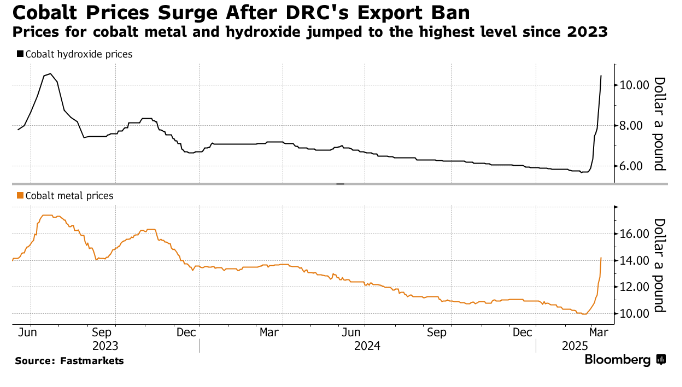Congo's Cobalt Export Ban: Market Impact And The Awaiting Quota Plan

Table of Contents
The Current State of Cobalt Mining in the DRC
The DRC's cobalt mining industry is a complex landscape with significant implications for both the global market and the nation itself.
DRC's Dominance in Cobalt Production:
The DRC controls approximately 70% of global cobalt reserves and produces over 60% of the world's cobalt. This dominance makes it a crucial player in the global supply chain, particularly for the burgeoning electric vehicle (EV) battery sector.
- Statistics: The DRC's cobalt production fluctuates yearly, but consistently accounts for the majority of global supply.
- Comparison: While other countries like Australia, Canada, and Zambia also produce cobalt, their output pales in comparison to the DRC's.
- EV Industry Dependence: The rapid growth of the EV industry creates enormous demand for cobalt, making the DRC's production critical to meeting this demand.
Environmental and Social Concerns:
Cobalt mining in the DRC has been plagued by serious environmental and social issues. Artisanal mining, while providing livelihoods for many, often lacks safety regulations and contributes to environmental degradation.
- Environmental Impact: Artisanal mining activities often lead to deforestation, soil erosion, and water pollution.
- Ethical Sourcing Issues: Concerns about child labor and unsafe working conditions in artisanal cobalt mines have drawn international attention and calls for ethical sourcing initiatives.
- International Initiatives: Organizations like the OECD and the EU are working to improve mining practices in the DRC through initiatives promoting responsible sourcing and due diligence.
Existing Export Regulations and Their Limitations:
The DRC currently has export regulations for cobalt, but these have proven insufficient to address the multifaceted challenges facing the industry.
- Existing Regulations: Current regulations primarily focus on taxation and licensing, but lack effective mechanisms for monitoring and enforcing ethical and environmental standards.
- Effectiveness: The current system has been criticized for loopholes and a lack of transparency, leading to uncontrolled export of raw materials and limited benefits for the DRC.
- Reasons for Inadequacy: Weak governance, corruption, and a lack of capacity within regulatory bodies hinder the effective implementation of existing rules.
Potential Market Impacts of a Cobalt Export Ban
A complete ban on unprocessed cobalt ore exports from the DRC would have profound and far-reaching consequences.
Price Volatility and Supply Chain Disruptions:
An export ban would likely trigger significant price increases for cobalt, potentially disrupting the global supply chain and impacting various industries.
- Price Fluctuations: The immediate impact would be a sharp increase in cobalt prices, as demand outstrips supply.
- Impact on EV Manufacturers: EV manufacturers would face increased production costs, potentially slowing down EV adoption rates.
- Search for Alternative Sources: The ban would accelerate the search for alternative cobalt sources and potentially stimulate investment in cobalt recycling and alternative battery technologies.
Geopolitical Implications:
The DRC's decision would have significant geopolitical ramifications, affecting its relationships with major trading partners and impacting global power dynamics.
- International Relations: The ban could strain relations with countries heavily reliant on DRC cobalt, leading to potential trade disputes and diplomatic tensions.
- Potential Trade Disputes: The DRC could face trade sanctions or retaliatory measures from affected nations.
- Impact on Global Power Dynamics: The situation could shift global power dynamics, as countries scramble to secure access to alternative cobalt sources.
Impact on the DRC's Economy:
The export ban carries both potential benefits and risks for the DRC's economy.
- Potential Benefits from Value Addition: The intended goal is to encourage domestic processing and value addition, generating higher revenues for the DRC.
- Risks Associated with Economic Dependence: Over-reliance on a single commodity makes the DRC's economy vulnerable to price fluctuations and market shocks.
The Proposed Cobalt Quota System: A Viable Alternative?
Instead of a complete ban, the DRC is also considering a quota system for cobalt exports.
Details of the Quota Plan:
The proposed quota system aims to allocate a specific amount of cobalt for export, prioritizing domestic processing and potentially reserving a portion for strategic partnerships.
- Specific Details: The exact details of the quota allocation criteria, including the volume to be exported and the selection process for beneficiaries, remain unclear.
- Transparency and Accountability Mechanisms: Transparency and accountability mechanisms are crucial for the success of any quota system, ensuring fair distribution and preventing corruption.
Potential Advantages and Disadvantages of a Quota System:
A quota system offers a potential middle ground between a complete ban and the status quo.
- Advantages: Controlled supply could help stabilize prices, and a quota system could promote fairer distribution of cobalt resources.
- Disadvantages: A quota system carries the risk of corruption and administrative challenges, requiring strong governance and robust monitoring mechanisms.
International Response and Collaboration:
The international community's response to the proposed quota system will be crucial for its success.
- Potential Support or Opposition: International organizations and trading partners may offer support or express concerns, depending on the design and implementation of the quota system.
- Impact on Trade Agreements: The quota system could have implications for existing trade agreements and potentially trigger negotiations or disputes.
Conclusion:
The DRC's potential cobalt export ban, or alternatively, the implementation of a quota system, presents a complex challenge with far-reaching implications for the global cobalt market and the electric vehicle industry. While aiming to improve domestic processing and generate greater economic benefits for the DRC, it carries risks of supply chain disruptions and price volatility. The proposed quota system offers a potential alternative, but its success hinges on transparency, effective implementation, and international cooperation.
Call to Action: Further research and analysis are crucial to understanding the full implications of Congo's potential cobalt export ban and the proposed quota plan. Stay informed about the evolving situation regarding the Congo cobalt export ban and its impact on the global market. Understanding the intricacies of cobalt supply chain management is crucial for navigating the future of this critical mineral.

Featured Posts
-
 Bof As Take On Elevated Stock Market Valuations
May 15, 2025
Bof As Take On Elevated Stock Market Valuations
May 15, 2025 -
 Bahia Vence Al Paysandu 1 0 Cronica Goles Y Resumen Del Encuentro
May 15, 2025
Bahia Vence Al Paysandu 1 0 Cronica Goles Y Resumen Del Encuentro
May 15, 2025 -
 Best Mlb Dfs Picks For May 8th Two Sleeper Picks And One To Avoid
May 15, 2025
Best Mlb Dfs Picks For May 8th Two Sleeper Picks And One To Avoid
May 15, 2025 -
 Michael Chandler Questions Paddy Pimbletts Ability To Withstand His Pace At Ufc 314
May 15, 2025
Michael Chandler Questions Paddy Pimbletts Ability To Withstand His Pace At Ufc 314
May 15, 2025 -
 Warriors Kings Game Draymond Greens Straightforward Comments On Jimmy Butler
May 15, 2025
Warriors Kings Game Draymond Greens Straightforward Comments On Jimmy Butler
May 15, 2025
